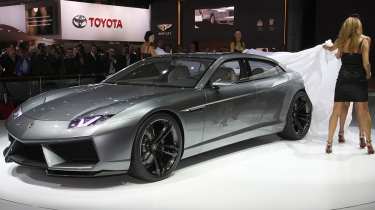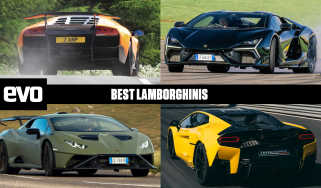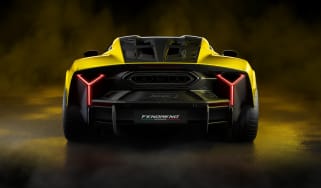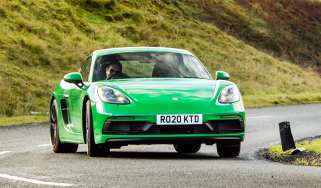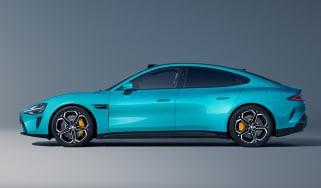Lamborghini Estoque: Lamborghini Estoque
Lamborghini unveils its £150,000, 200mph supersaloon. And if the idea of a four-door lambo feels a little strange, how about a turbodiesel?
Lamborghini has erased any lingering doubts that supercar makers are moving into the family haulage business by unveiling its four- door Estoque supersaloon concept at the Paris Show. Named after the 90cm sword a matador uses to dispatch the bull at the end of a bullfight – an irony that won’t be lost on tho se who believe Lambo should stick to making 200mph mid-engined two-seaters – the Estoque is seen as a pre-emptive strike against the forthcoming Aston Martin Rapide and, in particular, the Porsche Panamera, both of which will go on sale in 2009.
What began as little more than a toe-in-the-water exercise by Mercedes with the CLS, the four-door saloon packing swoopy coupe styling hasn’t just caught on but is marching briskly up-market, leaving even the AMG-engined CLS 63 looking a little low-rent. As things stand, though, the most powerful versions of the Aston and the Porsche – powered respectively by the 510bhp 6-litre V12 from the DB9 and the 500bhp 4.8-litre twin-turbo V8 out of the Cayenne – won’t be able to out-run the less costly and more compact Merc, which itself is being lined up for significant revisions soon. They’ll certainly need to factor in a new performance benchmark if the production Estoque (pronounced Ess-tock-ay) sees the light of day.
Although Lamborghini officially insists the Estoque is merely a concept that hints at possible future diversification, its own publicity material seems to contradict the assertion by boasting that the Estoque already complies with crash regulations and pedestrian safety laws. We spoke to Lambo boss Stephan Winkelmann just after its reveal to find out more.
It’s an open secret that Winkelmann has wanted to add a third model to the Gallardo and Murciélago ever since he joined the company in 2005, as it’s the only way he believes he can achieve substantial growth at Lamborghini. He’s also on record as saying that Lamborghini will never show a concept that it can’t produce. And given VW Chairman and former Audi boss Ferdinand Piech’s appetite for taking on Porsche at every turn, it doesn’t take much to join up the dots.
But why a saloon concept, rather than an SUV? Winkelmann believes SUVs have had their day and as no-one else is doing an ultra-exclusive Italian four-door at the moment, the way is open for Lamborghini. The ‘three-box’ saloon is also a globally understood layout, with real appeal in new markets like China and Russia, so potential sales would not be limited by niche market appeal.
Lamborghini’s last stab at a four-seater was the 1968 Espada, and the Estoque is similarly proportioned: long, wide and very low with four individual seats. But that’s pretty much where the similarities end. Where the Espada featured a full-house V12 driving the rear wheels, two doors and Giugiaro styling so outrageous it took your breath away (still does), the four-door, more conservatively styled Estoque will initially be offered with the 5.2-litre V10 from the Gallardo LP560-4 sitting behind the front axle, its 560bhp and 398lb ft being distributed to all four wheels.
What’s more interesting are the potential powerplants that Winkelmann mentions. There’s a possibility that the Estoque could use a turbocharged V8 derived from the V10, a V8 hybrid or even a high-performance turbodiesel. With the Gallardo LP560-4 powerplant installed, expect a 200mph+ top end and 0-60mph in four seconds.
Centro Stile Lamborghini has nailed the brand identity with the jutting, angular, Gallardo-esque air intakes that dominate the front of the car, the low aspect of which is made possible by the front-mid engine layout. Panning back in profile, the generous wheelbase, sucked-in sill accent, long roofline and shallow glazing lend a lithe elegance to the shape that disguises the sheer size of the wheels – 22- inchers at the front, 23s at the back – as well as allowing for decent-sized rear doors and a comfortable amount of rear legroom. The tail is short and sharply curtailed with a degree of ‘negative return’ and features slit-style LED tail lights, a long, horizonal air-vent covered in an Espada-like egg-crate grille, and broad, flattened hexagonal tail-pipes incorporated into the pseudo-carbonfibre diffuser. Lamborghini nevertheless claims ‘ample luggage space’.
The Estoque looks more muscular and aggressive from the front- and rear-three-quarter angles, where the crisp accent lines and flared, sectioned flanks are easier to appreciate and give the body a tautness and tension redolent of the company’s mid-engined supercars. Some of the exterior design motifs are carried through to the Nappa leather-trimmed cabin – most notably the door panel accent lines and the V-shape of the leading edge of the bonnet – while an LCD instrument panel, which provides vehicle and route information, is driver-configurable to display classic analogue dials or digital read-outs, much like it does in the Reventon. Also carried forward from the Reventon and Gallardo LP560-4 is the bi-Xenon and LED headlamp technology and the distinctive Y-shape rear lights.
If the Estoque gets the green light – and it’s difficult to imagine what would stand in its way – Winkelmann hints that it could become the first Lamborghini not to be built at Sant’Agata. Basically there would never be enough capacity at the old factory for the ambitious sales targets Lamborghini is predicting for the Estoque. Winkelmann told evo that potential sales could be as high as 2000-3000 cars a year, once all the various engine options come on stream, despite prices starting at a level equal with the base LP560.
If initial reaction is positive then Lamborghini will enter a feasibility exercise, though even if the Estoque were given the green light today it wouldn’t be ready for production until 2011 at the very earliest. By then the market will have had a taste of the Panamera and Rapide. Our guess is that it will be hungry for more.
The alternative supersaloons
Aston Martin Rapide
Porsche PanameraProduction versions of Porsche’s four-door are expected to be revealed in November and will be come with a number of different powerplants, including a hybrid. Porsche’s reasoning for building a saloon car is that an extended model line-up will help the firm cope with changing market trends (i.e. falling SUV sales). According to the company’s own figures, this exclusive saloon sector is worth one million sales a year worldwide. Porsche aims to sell 20,000 Panameras per annum.
Ferrari says ‘never’When asked if Ferrari would reconsider its recent statement that it would never build a four-door, Luca di Montezemolo wished Lamborghini, Porsche and Aston ‘good luck’ with their supersaloons. He then went on to confirm that, while he remained president of Ferrari, it would never build a four-door. He said it would detract from the firm’s focus on exotic sports cars. Conversely, it’s rumoured that Koenigsegg may be moving into the hyper-saloon sector, possibly as early as 2010.
